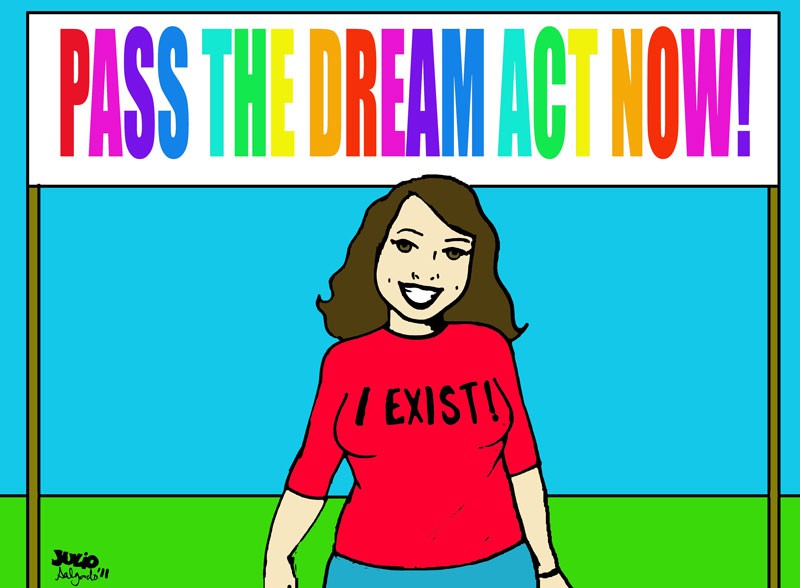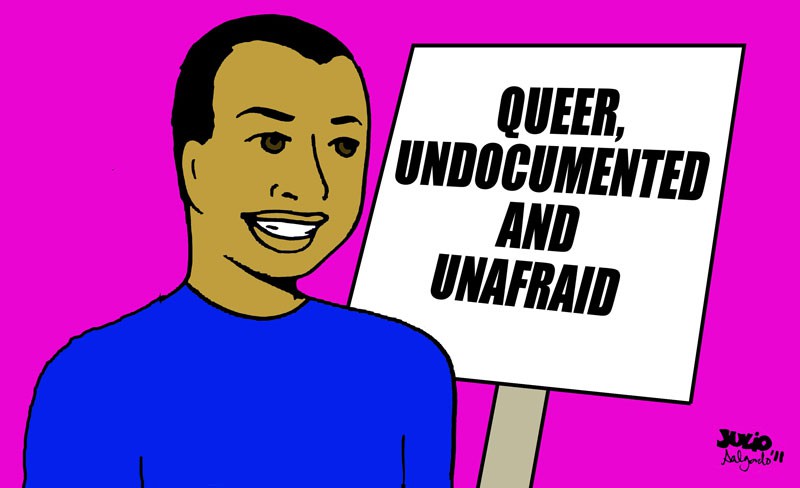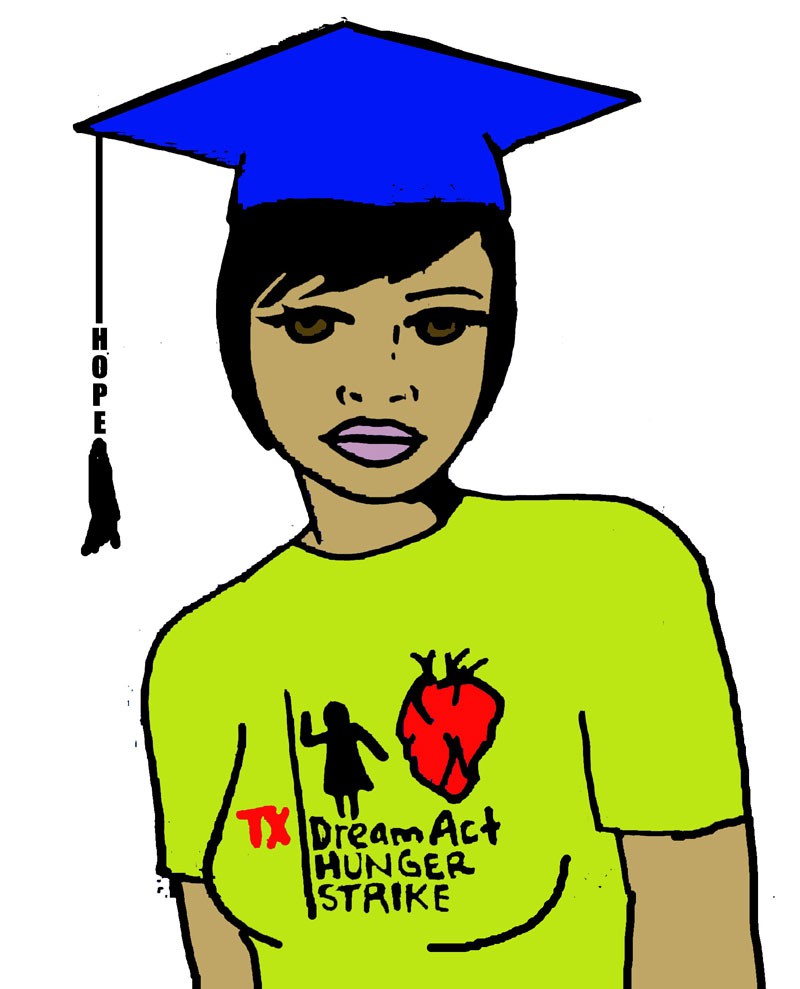
When officers of the Tucson, Arizona, police department walked into Senator John McCain’s local office last May to detain Yahaira Carrillo, Mohammad Abdollahi and Lizbeth Mateo for trespassing, the three activists were given the option of either walking out on their own or being handcuffed. They chose the former. The three undocumented youth had spent nearly a decade fighting for the passage of the Development, Relief and Education for Alien Minors (DREAM) Act, which would have given young people like them a path to citizenship via post-secondary education or the military. Unfortunately, the U.S. Senate failed to pass the bill last December. But the movement that’s been sparked by these young activists is bridging formerly disparate communities and drawing out many voices that were previously silenced.
Because Carrillo and Abdollahi are both undocumented and part of the LGBTQ community, the action ignited a sense of unity between two communities that are systematically oppressed by the conservative right. Their actions have inspired queer undocumented youth throughout the country to lead their own fights in the name of the DREAM Act.
Context
Arizona has recently become a hotbed of anti-immigrant policy. Just a month prior to the sit-in, the state had come under harsh national and international criticism for the enactment of Senate Bill 1070, which gave police officers the authority to act like immigration officers, requiring only “reasonable suspicion” to stop anyone they suspect of being undocumented. The law sets a frightening precedent that other states are already beginning to copy. More recently, a slew of anti-immigrant bills failed to pass in the Arizona Senate, one of them going as far as to propose reversing the U.S. 14th amendment, which gives automatic citizenship to U.S.-born children of undocumented migrants.
While immigration policy is hotly contested in government offices and living rooms across the country, the human stories often go untold. That is why young, undocumented leaders are starting to speak out. Carrillo, Abdollahi and Mateo made headlines by engaging the ultimate tool of protest for those who are undocumented: a sit-in at the senator’s office. They risked detainment and deportation to countries they barely remember.
If passed, the DREAM Act would grant conditional permanent residency and a path to citizenship to undocumented students who arrived in the U.S. as minors, as long as they complete at least two years of post-secondary education or military service. Although many undocumented students, activists and politicians have been pushing for the government to pass the Act since it was first introduced in 2001, it was the sit-in that brought the legislation to national attention. Hunger strikes and more arrests followed, but it was this action that will go down in history as the event that sparked a movement.
The following profiles chronicle the lives of three queer undocumented activists in the U.S., one of whom was involved in the famed sit-in, and two others who have followed suit and courageously advocated for the passage of the legislation over the last year.
Yahaira Carrillo
For Carrillo, who identifies as queer and knows a thing or two about coming out of the shadows, the act of civil disobedience by her and her fellow protestors was about taking control of their lives and developing a movement led by those who would be most affected by the DREAM Act.
Carrillo doesn’t remember much about her birthplace, Michoacán, Mexico. She was only seven years old when her parents brought her to the U.S. Growing up, it was only when talk about immigration would arise in her family that she was reminded that she didn’t have papers. It was a dark secret she wasn’t supposed to share with anyone. Other than that, she felt that she was no different from her classmates.
Like many of her fellow undocumented peers, it wasn’t until the last few years of high school that she realized how her immigration status would truly affect her future. Because financial aid is not available to students without legal documentation in the country, Carrillo would have to find a way to pay for college on her own. And because she couldn’t legally work in the country, finding a job to pay for her education was no easy task.
Carrillo became depressed. Her grades went down. Plans for college took a back seat and she figured that a high school diploma would be her greatest achievement – until she learned, after her 2003 high school graduation, about private scholarships that could help her pay for college. Unlike federal financial aid, these private scholarships are funded through donations by people who want to support dedicated students and don’t care about their citizenship status.
She enrolled for college courses at Donnelly College in Kansas City. Around this time, she began to tell people about her queer identity. The intersection between the struggles for rights for queer and undocumented people pushed her to get more vocal about her immigration status.
She found out about the DREAM Act in 2006 and quickly volunteered to spread the word. By 2007 she was helping people sign up for the 2007 mock graduation in Washington, D.C., put together by United We Dream, a national immigrant-youth-led organization. After realizing that comprehensive immigration reform was very unlikely, many young undocumented college students began to talk about pushing for more support for the DREAM Act as a stand-alone bill.
When a handful of young activists began talking about doing a sit-in, friends and family thought Carrillo was crazy for wanting to do it. “My mom was like ‘does it have to be you?’” Carrillo remembers. “Sure, I was scared. But I couldn’t not be part of this.”
Prior to the sit-in, students across the country participated in “Undocumented and Unafraid” rallies, which prompted increasing numbers of students to come out of the shadows and claim their identity. Queer people like Carrillo and Abdollahi knew about the power of coming out; the act of communicating their presence to the world, even if people reacted with suspicion or disdain, gave them a sense of shared existence.
Carrillo’s participation in the sit-in, and her willingness to risk deportation in order to stand up for her and her peers’ right to exist, has made her a hero to many undocumented youth. When they were arrested, Carrillo and Mateo leaned on each other to try and get some sleep on the cold detention bench. The fact that they had to be detained as criminals in order to tell the world that they existed was no easy pill for them, and other undocumented students, to swallow.
Despite the fact that their cases are still pending, Carrillo doesn’t regret a single thing. “We accomplished what we set out to do in putting the DREAM Act front and centre,” she says with a hint of pride in her voice. “If we were asked to do it again, we would do it in a heartbeat.”
Jorge Gutierrez

There are times when Jorge Gutierrez feels like he is fighting two battles: that for the passage of the DREAM Act, and, within that struggle, the battle for equal focus on queer issues.
“Sometimes I question if it’s the right moment or the right time,” Gutierrez tells me over chicken sandwiches and veggie pitas in his hometown of Santa Ana, California. “But because not many [queer, undocumented youth] are willing to speak out on the issue, it gives me the responsibility to speak out in the hopes that other people will get inspired.”
It’s his passion for both issues that caught the eye of director Anne Galisky, who invited him to be part of her documentary Papers: Stories of Undocumented Youth.
“Probably half of the DREAM Act leaders I’ve met are queer,” says Galisky of the student activists she has met in making the film, adding that these queer students know the value of coming out and how it saves them.
Gutierrez is a clear example of this. He says he knew from the age of five, when his father would reprimand him for his effeminate demeanour, that he was destined to fight for his right to exist. Growing up in Mexico, a largely conservative and Catholic country, Gutierrez remembers being attracted to boys his age. It was innocent. He wasn’t sure what it meant. All he knew was that his father would never accept a joto, derogatory Mexican slang for gay, as a son.
As he came of age, he learned that it wasn’t just his father who would not accept his queerness. At church, he learned that homosexuality was not morally acceptable in a Catholic society.
When Gutierrez turned 10, his mother decided to leave his father and moved the family to the U.S. For Gutierrez, this meant freedom from both his father and the conservative culture that surrounded him in Mexico. He welcomed the chance to start a new life in a land that promised true freedom and looked forward to the wider range of opportunities he thought the move would allow him and his older siblings.
After he started high school, Gutierrez didn’t have any trouble coming out as gay, but he did struggle to accept his identity as an undocumented individual. Years later, however, the surprising ease with which he’d been able to come out as gay helped Gutierrez to publicly come out as undocumented as well.
Gutierrez says that his outspoken claim to both identities has tokenized him at times, making him feel like he’s the only openly queer undocumented person talking about the intersection between the two struggles. But this only fuels his activism.
He is quick to point out that heterosexual undocumented folks need to check their privilege. Even as undocumented individuals, his heterosexual counterparts have the option of marrying into citizenship. According to the Defense of Marriage Act, marriage is still defined as being between a man and a woman in the U.S. Although the Obama administration recently deemed the law unconstitutional, renewing hopes that it will be overturned, for now, obtaining citizenship through marriage remains out of the question for gay undocumented youth.
In 2008, Gutierrez received a degree in English. But, without papers, instead of finding a job that fit the skills he acquired in college, he had no choice but to go back to waiting tables at a local food joint.
Last July, he was part of a group of 20 undocumented youth that held a hunger strike outside the office of Senator Dianne Feinstein in Los Angeles. Then in November, inspired by the May actions of other undocumented students, Gutierrez participated in a sit-in at Senator John McCain’s office in Washington, D.C. Wearing a blue graduation cap and gown with a rainbow ribbon pinned to his chest, Gutierrez and three other undocumented students were arrested for their civil disobedience.
“I knew this was bigger than me,” Gutierrez later reflects in the apartment he shares with friends, including an undocumented transgender woman and a lesbian couple. “I was doing this for my nephews, who are also undocumented and about to graduate high school and go through the same bullshit that we all go through.”
Asked if he believes that standing up for his rights is an American value he has learned in the 16 years he has lived in that country, he takes a moment to think. “If American means creating options for everyone in our community,” Gutierrez finally says, tongue in cheek, “then yes, I am an American.”
Lucy Martinez
When Lucy Martinez was in middle school, she remembers feeling embarrassed by her mother. An undocumented immigrant from Mexico raising three children on her own, Martinez’s mother had taken a job as a construction worker. Her reason for taking a job in a male-dominated industry was a no-brainer: it paid more than cleaning houses.

But for Martinez, it meant a mother who would show up to her school wearing a hard hat and dirty boots. “I was ashamed,” she says. “I didn’t understand why she had to do a man’s job. It made my family even more different.”
But her mother’s decision to go against the norm helped to inspire Martinez’s own defiance of the restrictive forces in her life. As an undocumented immigrant herself, Martinez was one of the many undocumented college students who came out of the shadows in 2010 to speak out about their situation.
Growing up in Texas, Martinez always knew that she was considered a criminal in the eyes of the United States government. But rather than allowing this to render her hopeless about her chances for obtaining any type of employment aside from the menial jobs she could get without a green card, Martinez pushed hard to achieve higher education.
As a sharp student, placed in a gifted program just a few months after arriving in the country at the age of six, the road to college should have been an easy one. However, for Martinez, it was far from a smooth transition. “I tried to block that part of myself to not put myself down in school,” Martinez says referring to her immigration status.
Around the time that Martinez was trying to figure out what to do after high school, she also began to come clean with her friends about another issue that she had been struggling with since she was a kid: she came out as a lesbian. “It was really hard because I didn’t know how to deal with both things,” Martinez remembers. “I didn’t know anyone else who was dealing with the same things that I was dealing with.”
After high school, she took some time off to save enough money to enroll at a junior college in Dallas, Texas, and then later moved to northern Texas to attend the University of Texas at San Antonio. It was there, during the summer of 2009, that she moved from spectator to organizer in the DREAM Act movement.
When hundreds of students staged a mock graduation in Washington D.C. in support of the DREAM Act that summer, she was inspired. Afraid to travel to another state because of her legal status, she began to mobilize locally. She contacted the North Texas DREAM Team and began to help table at her campus and pass out flyers informing her peers about the legislation.
Though she had been open about her sexuality in high school to some friends, she began to pull back the queer card in this new circle of friends and fellow activists. All of her life, she’d felt different. Now was a chance to finally fit in with other people who were like her. Yet, she knew that among her fellow heterosexual undocumented peers, she was still the odd woman out.
Eventually, she found the courage to go to an LGBTQ meeting on her campus. In front of over 100 of her queer peers, she opened up about her struggles as a queer undocumented individual and asked for their support in the passage of the law that would change her life. She received a standing ovation and her community responded.
Tired of not getting enough support through lobbying and legislative visits, Martinez led a hunger strike at the University of Texas last November, where she was joined by other students across the state and by the queer brothers and sisters who had given her the standing ovation.
“I remember that when we started the hunger strike Lucy didn’t want anybody to miss class,” laughs hunger strike participant and DREAM Act ally William Wise. “I see her as a very important leader of my community.”
Allies like Wise have been extremely helpful to the DREAM Act movement. Those with citizenship often volunteer to drive students to and from rallies since many of them are not allowed to drive in the U.S. More than anything, allies give undocumented students hope through moral support and their willingness to help.
Despite all of her challenges, Martinez takes comfort in knowing that her activism will serve its purpose one way or another. “You’re not a freak for being all these things at the same time,” Martinez says about what she has learned through her activism. “It’s up to us to do the work so that other people don’t have that feeling of not belonging.”
Dreaming on
Although the status of rights for undocumented youth remains uncertain, their organizing has offered them a sense of community, mutual support and belonging that makes their movement a force to be reckoned with.
In March of this year, undocumented student leaders from across the U.S. came together in Memphis, Tennessee, to talk about the future of the DREAM Act. They visited the National Civil Rights Museum at the Lorraine Motel, where civil rights leader Dr. Martin Luther King, Jr. was assassinated, and were re-inspired to keep on fighting for their right to exist in a country that still sees them as criminals.



_780_520_90_s_c1.jpg)

